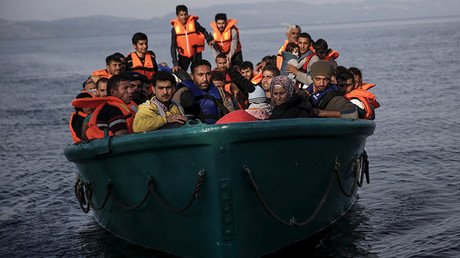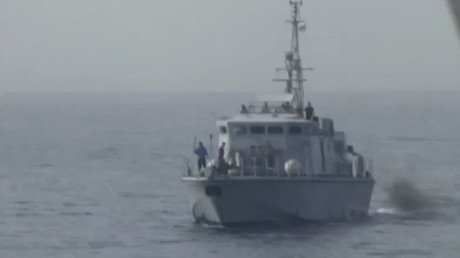EU complicit in Libya migrant torture and abuse – Amnesty
Not only are European governments aware of the “systematic abuse” and “appalling conditions” that migrants are exposed to by Libyan authorities, they are also involved in these crimes, Amnesty International has claimed in a recent report.
In an attempt to contain the influx of sea-borne migrants and refugees, the EU member states “actively” contribute to “a sophisticated system of abuse and exploitation of refugees and migrants by the Libyan Coast Guard, detention authorities and smugglers”, Amnesty International said on Tuesday.
Tortured. Raped. Sold. Rescued? No.This is the real face of the horrific EU deal with #Libya → https://t.co/f1wZlQouoXpic.twitter.com/76pnAtwQfi
— AmnestyInternational (@amnesty) December 12, 2017
“Hundreds of thousands of refugees and migrants trapped in Libya are at the mercy of Libyan authorities, militias, armed groups and smugglers, often working seamlessly together for financial gain,” said Amnesty’s Europe Director, John Dalhuisen. An estimated 20,000 people are currently kept in “these overcrowded, unsanitary detention centers,” where “torture is rife,” the group reports.
READ MORE: ‘Flawed EU govt policies’ leave refugees stranded in Libyan ‘living hell’ – Oxfam
Held in detention for three months, a man from Gambia told Amnesty about the suffering he endured: “In the center they don’t give food. They beat me with a rubber hose, because they want money to release me. They call the family while beating [you] so the family send money”.
Another man, from Nigeria, named “Victor”, described the fear he felt before setting off from Libya. “I had heard stories of Libyans arresting people at sea and taking them to prison, and from there asking them to call their families to make them send money; and stories of people who had died in the sea. But I feared Libya more; in Libya they treat anyone with a dark skin as an animal…”.
People are tortured.People are raped.People are sold.& EU is complicit in these horrific abuses, by sending people back to Libya → https://t.co/axNRZCmPybpic.twitter.com/qTl9wNAQWy
— AmnestyInternational (@amnesty) December 12, 2017
The EU is “complicit in these abuses”, Amnesty claims, singling out Italy. The EU governments provide support to Libya, train and equip the country’s coastguard with boats and other assistance, and clamp down on rescue efforts by the NGOs, Amnesty reports, in ‘Libya’s Dark Web of Collusion’.
“By supporting Libyan authorities in trapping people in Libya, without requiring the Libyan authorities to tackle the endemic abuse of refugees and migrants or to even recognize that refugees exist, European governments have shown where their true priorities lie: namely, the closure of the central Mediterranean route, with scant regard to the suffering caused”, Dalhuisen charged.
The European policies have proved efficient, resulting in a significant drop of sea crossings compared to last year’s figures and even to the first six months of 2017, Amnesty reports. While nearly 84,000 migrants arrived in Italy by sea in the first half of the year, some 33,288 disembarked there between July and November.
Breaking: 166,143 #migrants & #refugees arrived by sea to Europe. 3,091 dead/missing ➡️ https://t.co/NrTqBYkT2Cpic.twitter.com/A4fFfPe4ag
— IOM - UN Migration (@UNmigration) December 12, 2017
Meanwhile, 3,091 didn’t make it to the shore, the International Organization for Migration (IOM) statistics estimate.
Amnesty has urged the EU to “realize the horrific consequences of their policies of containment, recognize their unlawful nature, and reset their co-operation with Libya”, as well as to “enable people to get to Europe through legal pathways”.
The North African nation, ravaged by civil war, has turned into a launch pad for those fleeing persecution, war and poverty and making a perilous journey to Europe. The IOM identified more than 400,000 refugees in Libya, Amnesty says.














